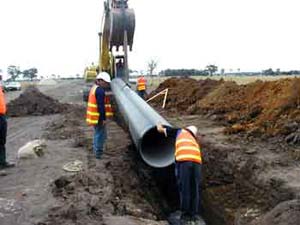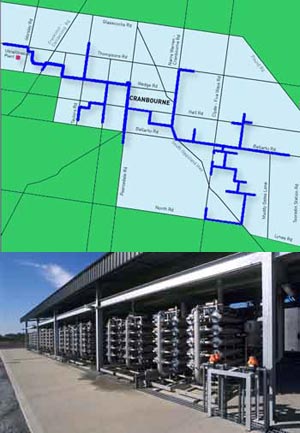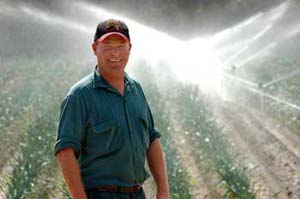|
|
Vegetable growers in Melbourne’s south east are glad their campaign for class-A recycled water was successful back in 2005. Since it was commissioned, the Eastern Irrigation Scheme has supplied up to 30 megalitres of class-A recycled water each day.
The recycling process takes class-C water from the Eastern Treatment Plant and purifies it to class-A quality at the TopAq ultrafiltration plant. The water is then distributed to users throughout the Cranbourne/Clyde area. Water treatment plant operator Earth Tech Engineering consider waste water from Melbourne’s east is far easier to treat than in wastewater from the west of Melbourne where saline industrial waste is more of an issue. Trying to removing the additional salt also makes the treated water too expensive for irrigators. South eastern water salinity is about half of what Werribee growers must deal with and growers have committed to taking the water for the next 20+ years, ‘take or pay’. Melbourne’s South East growers operate on the fringe of Melbourne’s suburbs. They supply local and national markets with Celery, Leeks, Broccoli and Lettuce as well as a wide range of bunching vegetable lines including Spring Onions, Parsley, Dutch Carrots and Radish. Like many other vegetable producers, the south eastern growers are largely family businesses who provide a fantastic employment multiplier to the Victorian economy. The larger vegetable operations directly employ up to 100 staff and provide considerable secondary employment and flow-on benefits to their local communities. Peter Cochrane has grown vegetables in the area for more than 30 years and says that recycled water is now a fundamental part of their family business. ” The local scheme is BRILLIANT “ “It’s given certainty – I know people who have expanded considerably, and they couldn’t have done that without it,” Mr Cochrane said. “Without the recycled water our production would be down 70-80% in summer and our customers would notice a shortage of quality carrots, parsley, radishes, spring onions and the other bunch lines we grow for Melbourne’s retailers.” Peter Schreurs and Sons have adopted an Environmental and Sustainability Policy for their business. They have implemented several nature-friendly initiatives including Integrated Pest Management and class-A recycled water. Mark Schreurs considers both their family business and their customers benefit from the security of a recycled water supply. “September is normally when we harvest stormwater for our dams but this year we had the driest September on record”, said Mark.
“Without recycled water, we couldn’t be confident of supplying vegetables over summer” |
|


